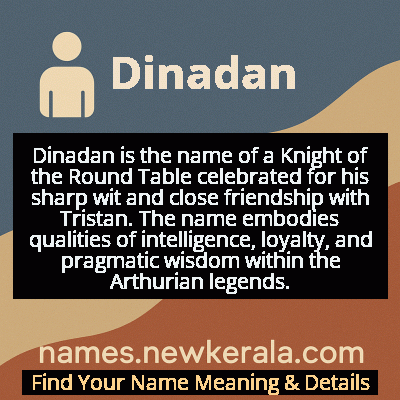Dinadan Name Meaning & Details
Origin, Popularity, Numerology Analysis & Name Meaning of Dinadan
Discover the origin, meaning, and cultural significance of the name DINADAN. Delve into its historical roots and explore the lasting impact it has had on communities and traditions.
Name
Dinadan
Gender
Male
Origin
Arthurian
Lucky Number
2
Meaning of the Name - Dinadan
Dinadan is the name of a Knight of the Round Table celebrated for his sharp wit and close friendship with Tristan. The name embodies qualities of intelligence, loyalty, and pragmatic wisdom within the Arthurian legends.
Dinadan - Complete Numerology Analysis
Your Numerology Number
Based on Pythagorean Numerology System
Ruling Planet
Moon
Positive Nature
Diplomatic, friendly, artistic, empathetic.
Negative Traits
Over-sensitive, moody, indecisive, prone to self-pity.
Lucky Colours
Green, cream, white.
Lucky Days
Monday.
Lucky Stones
Pearl, moonstone.
Harmony Numbers
1, 3, 4.
Best Suited Professions
Diplomats, mediators, caregivers, artists.
What People Like About You
Cooperative spirit, friendliness, artistic talent.
Famous People Named Dinadan
Sir Dinadan
Arthurian Knight
Known for his sharp wit and satirical poetry about knightly conventions
Dinadan of Cornwall
Literary Character
Featured prominently in the Prose Tristan and later Arthurian romances as Tristan's close companion
Dinadan the Satirist
Fictional Poet-Knight
Created humorous verses mocking the exaggerated ideals of chivalry and courtly love
Name Variations & International Equivalents
Click on blue names to explore their detailed meanings. Gray names with will be available soon.
Cultural & Historical Significance
Throughout medieval romances, Dinadan's role evolves from simple companion to moral commentator. His willingness to mock the very system he participates in makes him one of the most modern and relatable characters in medieval romance. He challenges the notion that knights must always seek combat and glory, instead advocating for practical wisdom and emotional intelligence. This subversive quality has made him a favorite among modern readers and scholars who see in him an early prototype of the enlightened skeptic in Western literature.
Extended Personality Analysis
Dinadan is characterized by his sharp intellect, wit, and pragmatic approach to life. Unlike many Arthurian knights who embrace chivalric ideals without question, Dinadan possesses a skeptical nature and often uses humor to expose the absurdities of courtly conventions. He is loyal to his friends, particularly Tristan, but maintains an independent mindset that allows him to critique the very society he serves. His intelligence makes him an excellent strategist and problem-solver, though he sometimes uses these skills to avoid unnecessary combat rather than seek glory.
Despite his cynical exterior, Dinadan demonstrates deep compassion and emotional intelligence, often serving as a voice of reason among more passionate knights. He understands human nature with remarkable clarity and uses this understanding to navigate the complex social dynamics of Camelot. His personality represents a rare balance in Arthurian literature—a knight who honors his commitments while retaining his critical faculties. This makes him both a reliable companion and an unpredictable element in the Arthurian world, valued for his wisdom even when his opinions challenge established norms.
Modern Usage & Popularity
The name Dinadan remains quite rare in modern times, primarily used by Arthurian enthusiasts, historical fiction fans, and parents seeking unique literary names. It has never ranked in popular baby name lists, maintaining its status as a distinctive choice that appeals to those with specific interests in medieval literature or Celtic mythology. Contemporary usage is mostly confined to fantasy literature, role-playing games, and academic circles studying medieval romance. The name's association with intelligence, wit, and loyal friendship makes it appealing to parents who value these qualities, though its unusual sound and strong Arthurian connections limit its mainstream adoption. In recent decades, there has been a slight increase in usage within fantasy and historical fiction communities, but it remains well outside conventional naming trends.
Symbolic & Spiritual Meanings
Dinadan symbolizes intellectual independence, pragmatic wisdom, and the courage to question established norms within traditional systems. He represents the delicate balance between loyalty to community and the freedom to think critically about that community's values. As a knight who prefers wit and strategy over brute strength, he embodies the enduring power of intelligence and reason in confronting challenges. His character serves as a metaphor for the modern intellectual—someone who participates fully in society while maintaining the perspective to critique its shortcomings. The name carries deep connotations of friendship that is both emotionally supportive and intellectually honest, representing relationships built on mutual respect rather than blind allegiance.

